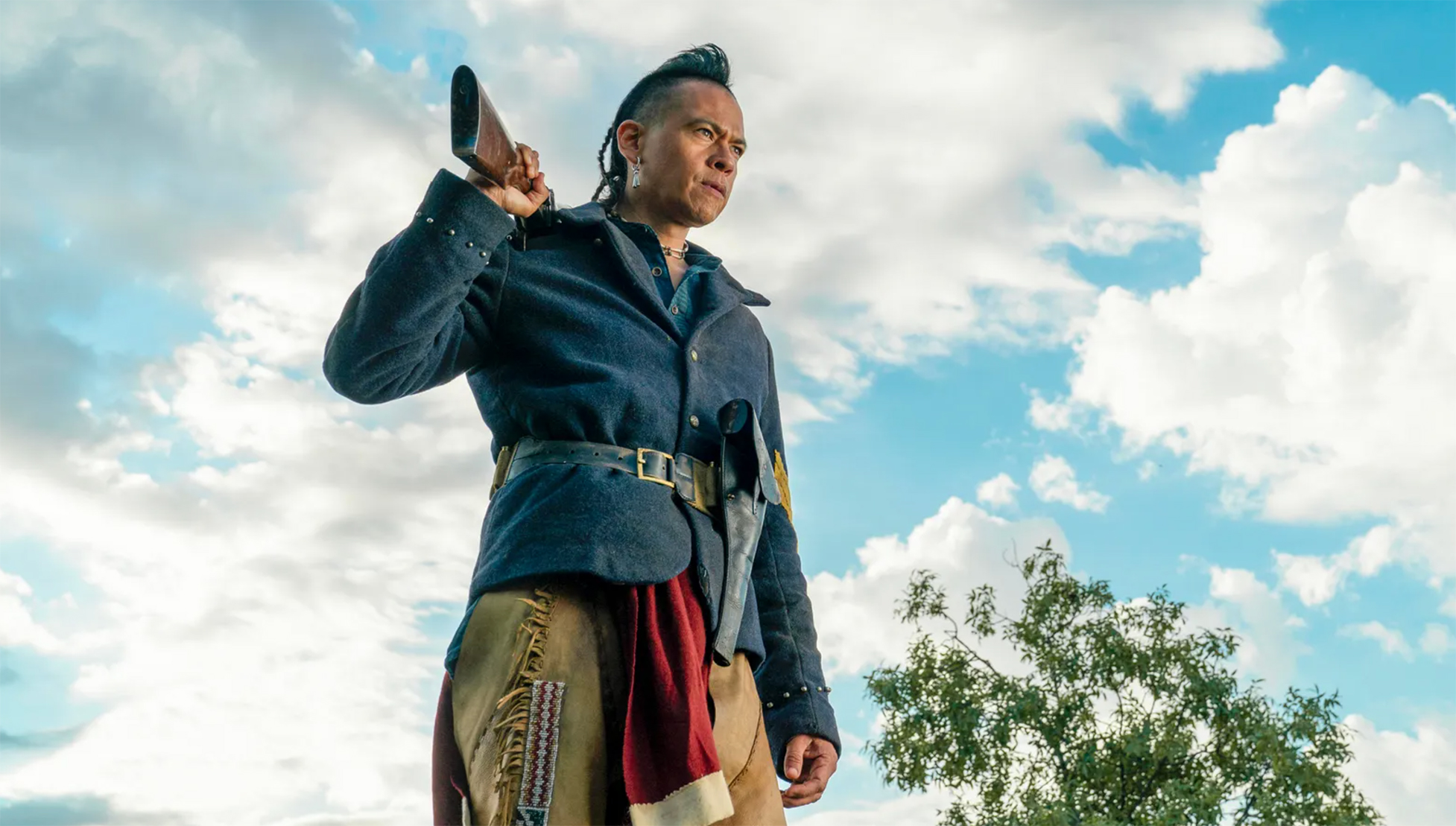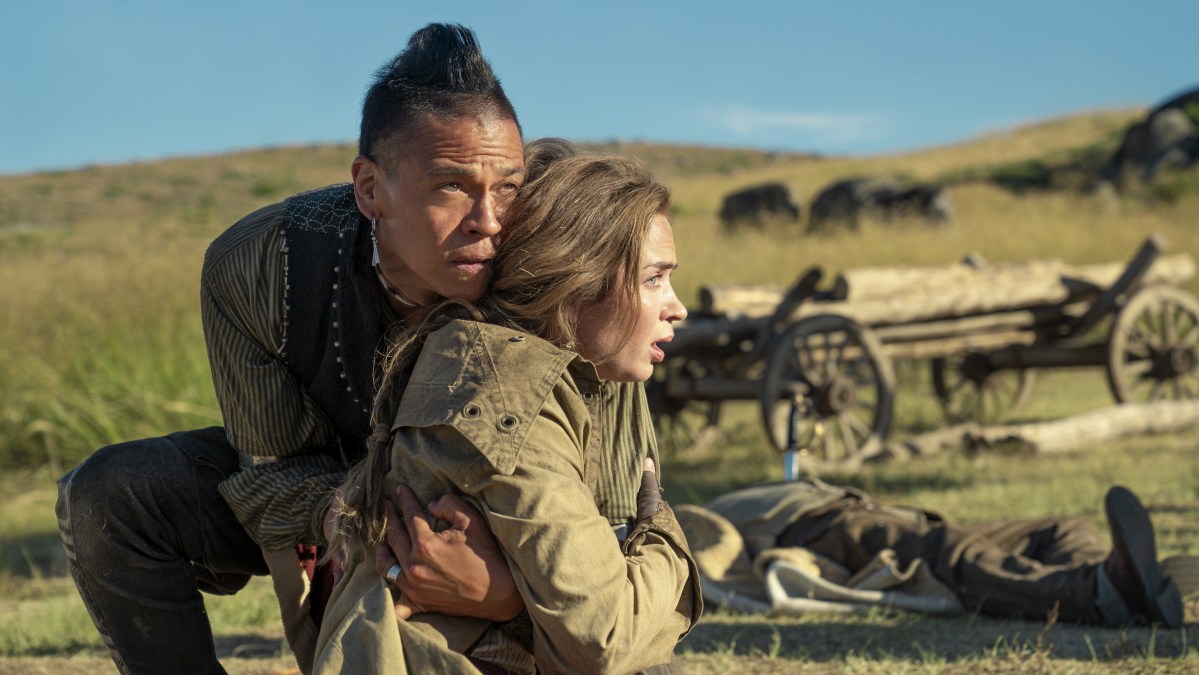This review is for The English, a western TV series premiering on Amazon Prime and the BBC on November 11.
The English is a truly international television series. It is a co-production between the BBC and Amazon, which shot near Madrid and premiered at Cannes. Its cast is populated with British and Irish actors, along with a host of Native American performers. It is also constructed as a love letter to the defining American genre, the western, albeit one constructed from perspectives often outside those narratives.
The six episodes of The English are written and directed by Hugo Blick. Blick is a fascinating creative talent, who has a long and rich history in British television, having worked in a variety of different genres. Operation Good Guys was a mockumentary show about police officers. The Shadow Line was a tense mystery unfolding in parallel on both sides of the law. Black Earth Rising was a drama looking at the prosecution of war criminals. The Honorable Woman was a political spy thriller.
From the opening scene of its premiere through to the closing credits of its finale, The English is fully immersed in the genre trappings of the western. In particular, and appropriately given the decision to shoot in Spain, it very consciously and very deliberately evokes the spaghetti westerns of the late 1960s and into the 1970s. Those international productions were named for an iconic Italian foodstuff, but they largely shot in Spain, in locations like the Tabernas Desert.
The English doesn’t try to hide its influences. Federico Jusid’s score consciously evokes the soundscapes of Ennio Morricone, particularly with its harmonic sequences. The opening titles sequence, credited to Scatterlight Studios, recalls the openings of movies like The Good, the Bad and the Ugly. Cinematographer Arnau Valls Colomer saturates the frame, particularly the blue skies and yellow shrubbery, to recall the look and feel of those older movies with their vivid colors.
As both screenwriter and director, Hugo Blick never tries to conceal his affection for the genre and its distinct sensibilities. There are plenty of wide shots of open wilderness, intense close-ups on characters’ eyes during tense standoffs, and anxious low angles. At times, it seems like Blick contorts the plot to get particular shots that he wants, such as a low Dutch angle looking up at a lone windmill spinning against a cloudless sky.

Blick’s love for the genre is evident. Indeed, the world of The English is so beautifully constructed that the show’s plot almost seems like an afterthought. It is a series built on indulgence. At points, it even recalls Quentin Tarantino’s pastiches of the genre, particularly in extended sequences that feature characters waxing rhapsodical about their circumstances and motivation, as if in love with the sounds of their voices. Fortunately for the show, those voices are easy to love.
That said, there are moments when Blick’s homages threaten to derail the series. The weakest scene in the entire six-episode run may be the very first. The English opens with an overt homage to the opening of True Grit, particularly the more recent adaptation directed by Joel and Ethan Coen. It is a coda in which the show’s protagonist, Cornelia Locke (Emily Blunt), reflects profoundly on her relationship to her co-lead, Eli Whipp (Chaske Spencer), and the events of the series.
Then again, the problem with that opening framing sequence might not be the homage itself, but instead the film that it is referencing. The English settles into a charming rhythm when it leans into the pulpier aspect of the genre. As with many of the European westerns from which it is drawing, The English has a heightened sensibility. It unfolds in a world that is just a little bit cartoonish and inhabited by human beings that frequently externalize their inner monstrosity.
At its core, The English is a classic western revenge narrative. The bulk of the story, told in extended flashback, follows Locke as she travels to the United States to avenge the death of her son. Her adventure truly begins when she crosses paths with Whipp, a Pawnee man who served with the Union during the Civil War. Whipp is journeying north to claim some land in exchange for his service. However, he discovers that the terrain is nowhere near as dangerous as those who stalk it.

As much as Blick builds The English around familiar western iconography, there is a playfulness to all this. Early in the first episode, Whipp is shocked to discover a local coachman (Toby Jones) has jury-rigged a shotgun defense mechanism around his carriage that he controls with the pull of a string. “Bit of a home inventor,” the frontiersman offers by way of explanation. There is a pulpy sensibility to the show that makes its flurries of violence all the more effective and unsettling.
The result of The English shooting to the north of the Tabernas Desert and largely around Madrid is that the show has a somewhat greener aesthetic than many of the movies that it evokes. It’s an effective choice that allows the show to feel at once familiar and novel, to riff on familiar iconography while also putting its own spin on the genre. The English is immediately recognizable as an old-fashioned revenge western, but from a slightly different angle.
This is reflected in the show’s central narrative, which foregrounds two perspectives often marginalized within these stories. Both Locke and Whipp are outsiders to the familiar western template, to the point that much of the six-episode season seems to be about the pair slowly making their way to the center of a more familiar story that finds Sheriff Robert Marshall (Stephen Rea) caught in the middle of a land dispute in the new township of Hoxem in Wyoming.
Locke is a woman who has traveled all the way from London in what is a likely doomed attempt to see justice done. Whipp is a Native American who has sided with the settlers against the indigenous population, only to be confronted with the reality that he has helped them create a world with no place for him. Much of the thrill of The English derives from the two characters as strangers in a strange land — one from overseas and one who has seen their own land rendered strange.
Befitting the mythic sensibilities of the genre that it evokes, The English is not an especially subtle work. The show returns time and again to sets of familiar imagery, from the brutality of animals asserting (or submitting to) a new natural order to the recurring preoccupation with babes and children. The English is a show that is about the afterbirth of a nation built on murder and carnage. “That ain’t right,” muses marauder Captain Clegg (Jan Knightley). “Death so close to new life.”
Blunt and Spencer make compelling leads, with an understated chemistry that anchors the show as it drifts through its six episodes. However, Blick also assembles an impressive cast around them, including past collaborators like Rafe Spall, Stephen Rea, and Malcolm Storry. Many of these character actors do impressive work in what are effectively guest appearances, such as Ciarán Hinds, Toby Jones, and Stuart Milligan. Blick justifies the show’s length by populating it with rich characters.
The English strikes a deft tonal balance. It is by turns blackly comic and monstrously grotesque, absurdly heightened and emotionally grounded. It works in large part because Blick’s scripts, along with Blunt and Spencer’s performances, root the show in the two leads’ shared journey. Whenever The English threatens to veer too far into the realm of the surreal, the show always finds its way back to Locke and Whipp’s fundamental humanity.
The English occasionally feels like an indulgence, but it’s one worth making. Befitting so many of the movies from which Blick is drawing, the show’s beautiful and stylized exterior belies an effective and unsettling meditation on American history. If the western is the foundational American myth, then The English reimagines it as a dark fairy tale.






Published: Nov 7, 2022 03:00 pm